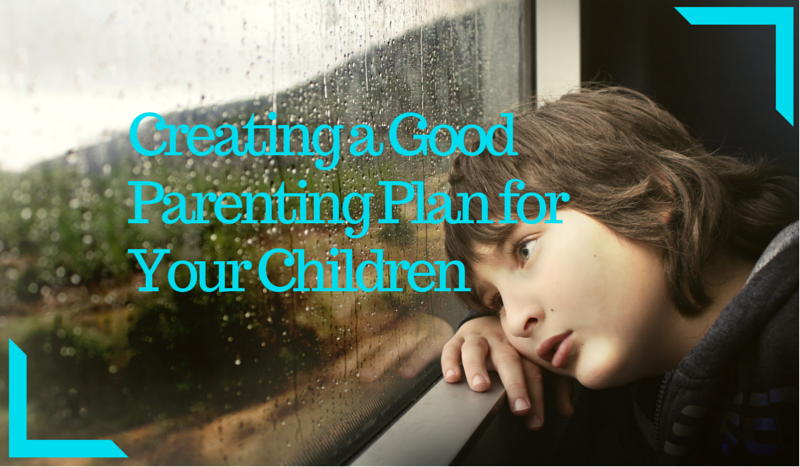Parenting Plans Part 1: Creating a Good Divorce Parenting Plan for Your Children

There are no conversations more poignant or heartfelt than those in which you and the other parent discuss how you will take care of your children during and after the divorce.
When your children were born, you imagined parenting with your spouse every day and night. Now your time with them is scheduled in advance and limited, with less spontaneity. The quiet of your home and reduced contact in-between visits is hard for everyone.
This first post in my Parenting Plan series summarizes what I have learned and read over the last 15 years while helping parents decide how they will take care of their children when the family no long lives together. Though I am not a therapist, I have gathered information from many professional resources, read books, and attended many workshops on parenting. The best outcomes that I have been part of happened when parents started to build their plan by considering the factors listed below.
A Good Divorce Parenting Plan Is One That Works Well for Both Parents
A parenting plan is part of the mediated agreement (MOU) that states when the children will be with each parent (called “parenting time”) and how major decisions will be made (legal custody). It includes many details about the logistics and other aspects that hopefully are designed with the children’s comfort, happiness, and well-being in mind.
I am frequently asked to describe the “best” parenting plan. I always say the same thing. The best plan is the one that eliminates conflict and that you both are most comfortable with. The parenting plan that emerges from your discussions will work for the kids if it works for both of you. A well-written plan provides children and parents with predictability and consistency.
Things to Consider When Creating a Divorce Parenting Plan
- Ages of the children.
- How mature each child is.
- The strength of each child’s attachment to a parent or routine.
- How far apart the parents might live from each other.
- Child care needs in each location.
- Flexibility of each parent.
- How transportation will work.
- How well the parents communicate.
- Where the children’s friends and community are located.
- How maintainable the schedule will be.
- Whether the children’s sleeping patterns are maintained.
- Whether travel time (by car or other transportation) is reasonable.
Parental Behaviors That Benefit the Children
- Encourage and invite the children to have regular contact with the other parent.
- Keep predictable schedules.
- Transfer the children between residences without arguing or discussing logistics.
- Let the children bring items important to them from one home to the other.
- Follow similar routines for meals, snacks, wakeup time, bedtime, homework, and discipline in each home.
- Encourage and support contact with extended family members.
- Allow the children to participate in family celebrations on both sides.
- Provide advance notice about schedule changes.
- Readily provide travel plans and details.
- Support all of the activities of the children.
- Have regular (at least weekly) communication to discuss and confirm logistics.
Parental Behaviors That Make Life Difficult for Children During and After Divorce
- Questioning the children about the other parent’s activities.
- Making promises you don’t keep or are inconsistent with the agreed-upon schedule.
- Discussing money or other child support issues with the children.
- Using money as a parenting leverage.
- Asking the children to carry messages to or to spy on or to keep secrets from the other parent.
- Undermining the relationship by putting down or criticizing the other parent with the children or in their hearing.
A Good Parenting Plan Provides Benefits with Lasting Effects
Preserving the children’s healthy and ongoing relationships with both parents has enormous positive impact on everyone involved. It is worth your time and effort to build and maintain a good plan so that your children continue to thrive during and after your divorce.
Resources About Parenting During Divorce
- Parenting Plans Part 1: Creating a Good Divorce Parenting Plan for Your Children (this post by BJ Mann)
- Parenting Plans Part 2: The Top Dozen Parenting Issues in Divorce by BJ Mann
- Parenting Plans Part 3: Divorce Parenting Plans That Work by BJ Mann
- Parenting Plans Part 4: What Else Does Your Parenting Plan Need to Have? by BJ Mann
- Mindful Co-parenting Guide A guide to many aspects of parenting through and after divorce. Specific strategies for those aspects can be found by using the search box on any page of BJ’s site.
- Putting Children First: Proven Parenting Strategies for Helping Children Thrive Through Divorce (aff) book by Joanne Pedro Carroll
- Planning for Parenting Time: Arizona’s Guide for Parents Living Apart (free downloadable PDF). This excellent document provides sample plans and dicusses the pros and cons of each.
- Parenting Plan Checklist
- Parenting Checklists
- Downloadable and Printable Parenting Tools
- Household Safety Checklists
- Divorce Checklists and Worksheets
- Sample Parenting Plans for Angry, Distant and Cooperative Divorces
- Emery’s Alternative Parenting Plans (Child Custody Schedules)
- New Research Insights into Guidance about Parenting Plans
Photo credit: Unsplash.com (photo) and Canva.com (design)
